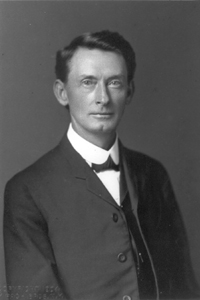Thomas E. Watson
| Thomas Edward Watson | |
|---|---|
 |
|
|
United States Senator from Georgia |
|
|
In office March 4, 1921 – September 26, 1922 |
|
| Preceded by | M. Hoke Smith |
| Succeeded by | Rebecca L. Felton |
| Member of the U.S. House of Representatives from Georgia's 10th district |
|
|
In office March 4, 1891 – March 3, 1893 |
|
| Preceded by | George T. Barnes |
| Succeeded by | James C. C. Black |
| Member of the Georgia House of Representatives | |
|
In office 1882–1883 |
|
| Personal details | |
| Born |
September 5, 1856 Thomson, Georgia, U.S. |
| Died | September 26, 1922 (aged 66) Washington, D.C., U.S. |
| Resting place | Thomson Cemetery |
| Nationality | American |
| Political party | Democrat, Populist |
| Spouse(s) | Georgia Durham Watson |
| Alma mater | Mercer University |
| Profession | Politician, lawyer, editor, publisher, teacher |
Thomas Edward "Tom" Watson (September 5, 1856 – September 26, 1922) was an American politician, attorney, newspaper editor and writer from Georgia. In the 1890s Watson championed poor farmers as a leader of the Populist Party, articulating an agrarian political viewpoint while attacking business, bankers, railroads, Democratic President Grover Cleveland and the Democratic Party. He was the nominee for vice president with William Jennings Bryan in 1896 on the Populist ticket (but there was a different vice presidential nominee on Bryan's Democratic ticket of 1900 and 1908).
Elected to the United States House of Representatives in 1890, Watson pushed through legislation mandating Rural Free Delivery, called the "biggest and most expensive endeavor" ever instituted by the U.S. postal service. Politically he was a leader on the left in the 1890s, calling on poor whites and poor blacks to unite against the elites. After 1900, however, he shifted to nativist attacks on blacks and Catholics (and after 1914 on Jews). Two years before his death, he was elected to the United States Senate.
Thomas E. Watson was born September 5, 1856, in Thomson, the county seat of McDuffie County, Georgia. He was of entirely English descent. After attending Mercer University (he did not graduate; family finances forced withdrawal after two years), he became a school teacher. At Mercer University, Watson was part of the Georgia Psi chapter of Sigma Alpha Epsilon fraternity. Watson later studied law and was admitted to the Georgia bar in 1875. He joined the Democratic Party and in 1882 was elected to the Georgia Legislature.
...
Wikipedia
